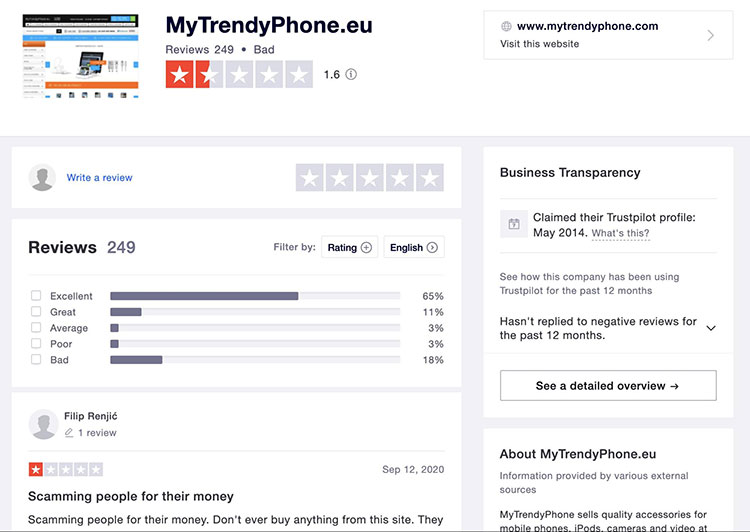It’s not easy for search engines to choose the 10 best results for your query from 4 billion pages on the web. It takes sophisticated algorithms to efficiently crawl, filter and sort the entire internet. Google evaluates websites, in part, based on the reputation of every brand, organization or individual its crawlers encounter.
Google favors the most reputable brands and organizations. They are rewarded with higher positioning in the search results and more organic traffic. Reputation matters to Google because it’s a signal that they can use to independently verify the quality of information and trustworthiness of brands.
If you sell a product or service online, Google is trying to figure out how risky it would be to do business with you. Is it likely your customers will get what they expect? Or are you a risk to your customers’ finances, health, or happiness?
This is where SEO reputation management practices come into play. They can signal to Google that your business is trustworthy enough to be shown consistently to users. Read on to learn easy-to-implement eCommerce reputation management techniques that will gain Google’s trust in no time.
What Is Reputation Management in SEO?
Reputation management SEO practices focus on proving that Google and your site visitors can trust your brand. They help you build authority through positive customer experiences and 3rd party opinions, relationships with industry experts, and clear content on the expertise of your brand.
Implementing SEO techniques for reputation management can improve how trustworthy Google sees your website, which impacts your ranking on Search Engine Results pages. The better your reputation with Google, the higher and more frequently you’ll rank.
5 Steps For SEO Reputation Management
1. Evaluate Your Brand’s Current Reputation
Google emphasizes independent and expert opinions of your organization or website to evaluate your reputation. Search engines go to great lengths to find this information and determine its authenticity. They are keenly aware that the opinions you provide on your website may be biased or misleading since you want to bring in customers – not drive them away.
Google weighs the information you provide about your brand or organization with the information it gathers from independent sources. They want to learn about the experience of real visitors to your website and the opinions of experts in your field. They seek to evaluate the information on your website and your brand/organization as a whole.
Important: To determine your authority, Google trusts 3rd party, independent sources first and the information you provide on your website second.
Google does not blindly accept the information on your website. They are skeptical about the information you provide until it’s verified by 3rd parties.
They are looking for experts in your field writing about you, reviews written by real customers on 3rd party websites, references in news articles, citations in industry publications, customer sentiment in forum posts and other credible information written by independent individuals.
Google can read the entire web and figure out what you are known for in your category. Is your reputation positive, or does it need some work?
Case study: Negative Reputation
We did an investigation a while back into a European mobile phone accessories website. They sell tech gadgets and phone cases.
Their organic traffic had decreased steadily in recent years despite their best efforts to optimize their site and create compelling content. Our investigation revealed that Google had penalized them for their poor reputation.
Take a look at their reviews below on their Trust Pilot profile below. After Google found out about these awful reviews, reputation management SEO practices couldn’t save their site. They had to relaunch their business with a new brand and website with improved customer service
It’s hard to recover your organic traffic when Google thinks you mistreat your customers.

2. Build Authority by Improving Your Reputation
Now that you’ve got an idea of what Google is looking for, what concrete steps can you take to improve your reputation?
First and most important…You must delight your customers with your product/service. Then, focus on publishing accurate information and demonstrating industry-leading expertise. There is no way around these steps, and you can’t fake it for long.
You must demonstrate the positive attributes of your brand/website often on your site and 3rd party sites. We want your positives to be positioned where Google is looking.
Here are some specifics to think about:
- Are your products/services recommended by experts?
- Are your product reviews positive or negative (or fake)?
- Have you won awards in your industry?
- Do professional societies write positively about your organization?
- What does Wikipedia say about your organization?
- Is your brand associated with any controversies or issues?
- What industry trade groups or professional societies are you affiliated with?
- Are there any high authority organizations in your industry that you are associated with?
- What are people saying on Yelp, Better Business Bureau, Amazon or Google Shopping?
- What is the press saying about your business in news articles?
- What other forms of recognition have you received?
- Is your brand associated with any misconduct, criminality or fraud?
- What is the reputation of the authors on your website?
- Can you say more about your authors’ affiliations, background, etc?
3. Source 3rd Party Opinions on your Brand
Google uses its vast resources to search the web for information about your organization. The information found is used to determine your reputation. Google trusts opinions independent of your organization the most.
For example, US News published a glowing review of the Tesla Model 3 (see the screenshot below). The review even includes quotes from equally glowing reviews published by other news outlets. Google takes notice of these mentions and rewards brands with positive attention.

4. Incorporate Trust Factors Throughout Your Site
Trust factors are tidbits of information about your business that boost authority and trustworthiness. Displaying them prominently throughout your website is a reputation management SEO technique that impacts how both visitors and Google see your brand.
Insurify is a tech startup that simplifies the process of finding insurance. When browsing their website you will find several “trust factors” that bolster their reputation on Google. For example, they have many prominent advisors on their board. They are licensed in good standing with all 50 states and they have received industry awards.
They display these trust factors in a way that allows Google to easily take notice of them. The “Awards and Recognition” section of their website (see the image below) lives on their About page with many other important trust factors.
Google will detect these trust factors and seek to verify them with independent information published by 3rd parties.

5. Leverage the Reputation of Others
Seek out authoritative authors within your industry that you can hire to write content for your site. This reputation SEO practice allows you to “borrow” reputation from a trustworthy author.
Websites that publish information written by authoritative authors in their industry can “borrow” reputation from the authors. Be sure to include critical information about the author in the byline. Take a look at the example byline and list of citations below. It appears in an article published on an opioid addiction treatment blog.
This byline is a signal to Google that the information in this article was written by a qualified professional and represents mainstream medical advice that is accepted among experts in the medical field. The citations further cement the legitimacy of the information and the author.

Reputation Matters
Building a positive reputation that Google notices starts with treating your customers well. After ensuring that your business practices top-notch customer service, focus on building relationships in your industry. Next, use these relationships to compile and display trust factors so Google sees the company you keep and all the other reasons web visitors should trust you.
Using these SEO reputation management techniques will have Google rewarding you with higher rankings and more organic traffic in no time.
If you’re looking for expert SEO reputation management services to boost the trustworthiness of your website, take a look at Fire&Spark’s eCommerce offerings.

